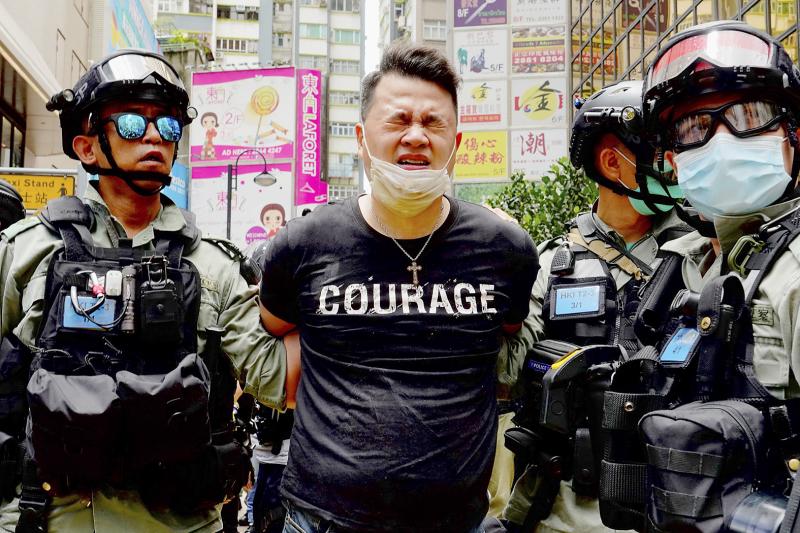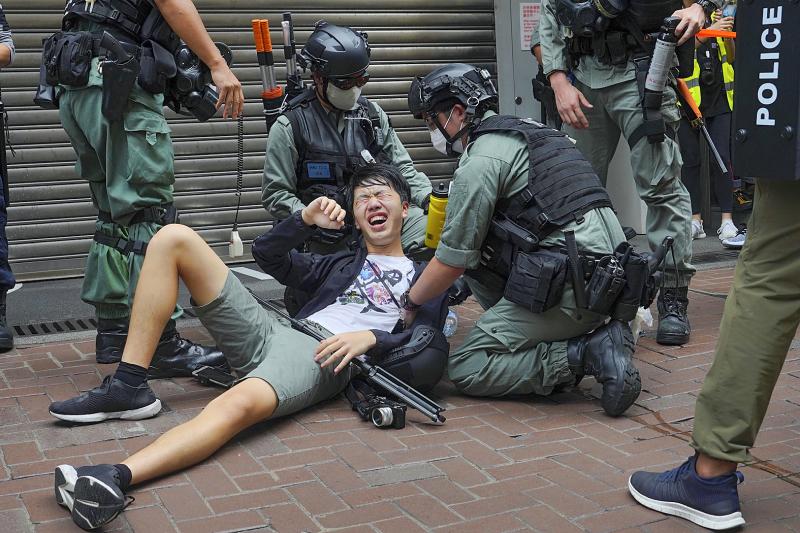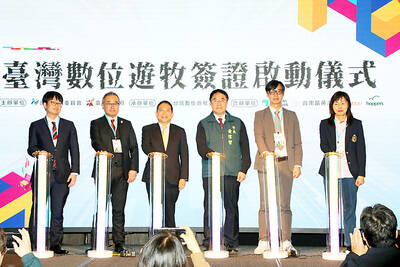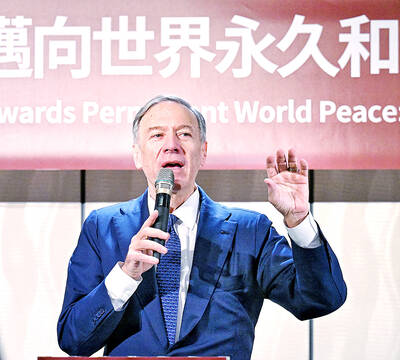Hong Kong police yesterday made their first arrests under a new national security legislation imposed a day earlier by China’s central government, detaining at least seven people suspected of breaching it during protests by thousands of people.
One man with a Hong Kong independence flag was arrested at a protest in the territory’s Causeway Bay shopping district, police said.
Police arrested another woman for holding up a sign displaying the British flag and calling for Hong Kong’s independence.

Photo: AP
Three other women were detained for possessing items advocating independence.
Further details were not immediately available.
Hong Kong police wrote on Facebook that they arrested more than 180 people on various charges, including unlawful assembly, possession of weapons and breaching the national security legislation.

Photo: AP
The arrests came as thousands of people took to the streets in an anti-government protest on the 23rd anniversary of Britain’s handover of Hong Kong to China in 1997.
For the first time, police banned this year’s annual march.
Protesters shouted slogans, lambasted police, and held up signs condemning the Chinese government and the new security legislation.
The legislation, imposed by China after pro-democracy protests in the territory last year, makes secessionist, subversive or terrorist activities illegal, as well as foreign intervention in the territory’s internal affairs. Any person taking part in secessionist activities, such as shouting slogans or holding up banners and flags calling for the territory’s independence, is contravening the legislation, regardless of whether violence is used.
The most serious offenders, such as those deemed to be the masterminds behind the crimes, could receive a maximum punishment of life in prison. Lesser offenders could receive jail terms of up to three years, short-term detention or restrictions.
Hong Kong Chief Executive Carrie Lam (林鄭月娥) endorsed the new legislation in a speech marking the handover of the territory — officially called the Hong Kong Special Administrative Region (HKSAR) — from British colonial rule.
“The enactment of the national law is regarded as the most significant development in the relationship between the central authorities and the HKSAR since Hong Kong’s return to the motherland,” Lam said, following a flag-raising ceremony and the playing of China’s national anthem.
A pro-democracy political party, the League of Social Democrats, organized a protest march during the flag-raising ceremony.
About a dozen participants chanted slogans echoing demands from protesters last year for political reform and an investigation into accusations of police abuse.
Claudia Mo (毛孟靜), an opposition Hong Kong lawmaker, told a news conference that the security legislation does not abide by the rule of law and is a dire warning to the free press.
“This would tell you that they want not just to get us, but to intimidate us into inaction, into a catatonic state,” Mo said.
Meanwhile, British Secretary of Foreign and Commonwealth Affairs Dominic Raab announced that residence rights for Hong Kongers eligible for British National Overseas (BNO) passports would be extended to five years.
Raab told the House of Commons that the new rules would allow more than 3 million Hong Kongers the right to live and work in Britain without the current six-month limit.
After five years in the UK, BNO passport holders could apply for settled status and then apply for citizenship 12 months after that.

ANNOUNCEMENT: People who do not comply with the ban after a spoken warning would be reported to the police, the airport company said on Friday Taoyuan International Airport Corp on Friday announced that riding on vehicles, including scooter-suitcases (also known as “scootcases”), bicycles, scooters and skateboards, is prohibited in the airport’s terminals. Those using such vehicles should manually pull them or place them on luggage trolleys, the company said in a Facebook post. The ban intends to maintain order and protect travelers’ safety, as the airport often sees large crowds of people, it said, adding that it has stepped up publicity for the regulation, and those who do not comply after a spoken warning would be reported to the police. The company yesterday said that

QUIET START: Nearly a week after applications opened, agencies did not announce or promote the program, nor did they explain how it differed from other visitor visas Taiwan has launched a six-month “digital nomad visitor visa” program for foreign nationals from its list of visa-exempt countries who meet financial eligibility criteria and provide proof of work contracts. To apply, foreign nationals must either provide proof that they have obtained a digital nomad visa issued by another country or demonstrate earnings based on age brackets, the Bureau of Consular Affairs said. Applicants aged 20 to 29 must show they earned an annual salary of at least US$20,000 or its equivalent in one of the past two years, while those aged 30 or older must provide proof they earned US$40,000 in

NEW YEAR’S ADDRESS: ‘No matter what threats and challenges Taiwan faces, democracy is the only path,’ William Lai said, urging progress ‘without looking back’ President William Lai (賴清德) yesterday urged parties across the political divide to democratically resolve conflicts that have plagued domestic politics within Taiwan’s constitutional system. In his first New Year’s Day address since becoming president on May 20 last year, Lai touched on several issues, including economic and security challenges, but a key emphasis was on the partisan wrangling that has characterized his first seven months in office. Taiwan has transformed from authoritarianism into today’s democracy and that democracy is the future, Lai said. “No matter what threats and challenges Taiwan faces, democracy is the only path for Taiwan,” he said. “The only choice

UNITY MESSAGE: Rather than focusing on what Trump said on the campaign trail about Taiwan, Taipei should be willing to engage with the US, Pompeo said Taiwan plays a key role in Washington’s model of deterrence against China, former US secretary of state Mike Pompeo said in a speech in Taipei yesterday. During US president-elect Donald Trump’s first term, “we had developed what we believe was a pretty effective model of deterrence against adversaries who wanted to undermine the set of rules and values that the people of Taiwan and the people of the US hold dear,” Pompeo said at a forum organized by the Formosa Republican Association. “Succeeding in continuing to build this model will not solely rest at the feet of president Trump and his team,